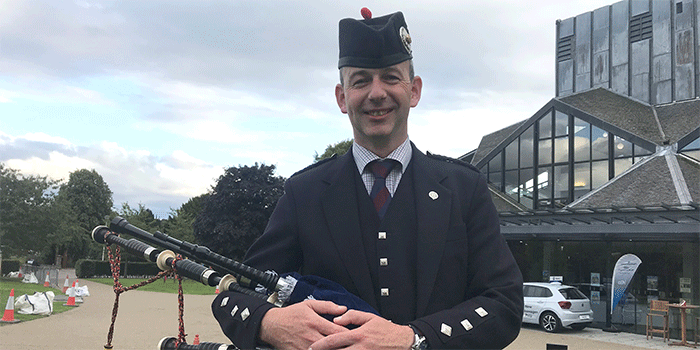
The audience at the Inverness Silver Medal 2018, although small, was bigger than in recent years – perhaps because the set tunes for this competition were thought more interesting than those set for the Gold Medal, both competitions running simultaneously. The room at Eden Court Theatre was a bit small but the acoustics were good.
MacCrimmon’s Sweetheart
Four played this tune. It has been a very popular piece and it is difficult to put a personal stamp on it. Edward McIlwaine had a bold bagpipe with a metallic sound which remained in tune throughout. There were no issues with his ground and thumb variations. In Variation 3 he tended to shorten the Es in the cadences and continued this in the technical variations with a consequent loss of expression. Jason Craig played musically on a good bagpipe which then went badly out of tune. Ursa Beckford had an interesting strategy to his tuning prelude – he did not adjust his drones but blew his bagpipe. The result was an in tune instrument – and it suited the acoustics too. The ground was rather careful and this continued into the Thumb; the tempo of the doubling of the Thumb was nicely handled. The contrast between the singling and doubling of Variation 3 was verging on the extreme. Ben McClamrock: A good bagpipe; Ground and Thumb variations without adverse issues; in the transition to the tripling there was a slightly long hiatus; in the fosgailte singling the C and B notes prior to the grips were slightly short – not a serious fault.

MacLeod’s Salute
Four played this tune. Edward Gaul started well but unfortunately had a break down. John McDonald’s bagpipe was in tune but his chanter was inclined to chirp; he got a good hold of the ground, but the tune gathered a little bit of speed and was on the edge of being fast – though he could still handle the technique; he had a small skirl in the crunluath. As maybe a matter of interest John played the tune based partly on the setting from Donald MacDonald’s unpublished MS. Charles MacDonald’s tune was OK, save for the low G which was unpleasantly intrusive. He has a good finger. Zephan Knichel came on with a good bagpipe. The Ground was without issue. In Variation 1 he had a minor hesitation but otherwise this was steady playing. In the taorluath and crunluath there are no cadence motifs, but subtle phrasing should be attempted; good fingerwork. All with the exception of John McDonald played the ‘Donald Mor Run Down’ and played it very much the same way as each other.
King’s Taxes
Three played this tune. This tune was probably the most difficult to interpret of all the Silver set tunes. There are many recordings of it and it appears that pipers have maybe listened to them and were trying to satisfy everybody – not possible! Alex Gandy had a very good bagpipe; his technique was very good too; the Ground tended to be played in beats and not strung together in phrases; Variation 1 singling and doubling were well fingered but lacked expression. I am sure Alex is aware that it is not enough to play with a good pipe and good finger – musical expression is paramount. Ben Duncan had a rather high pitched pipe; the ground was again played in beats and not in phrases; Variation 1 singling and doubling were at times a bit square; the tripling singling was stilted and lacked flow. Calum Wynd had a bagpipe which daresay was more suited to a pipe band; it was rather harsh. The ground was well-paced and phrased. The first variation singling was rather good, but in the doubling it deteriorated through a lack of expression.
Glengarry’s March
Four played this tune. Maël Sicard Cras, had problems with his bagpipe and did not get it into tune. His timing of the ground was odd with a hesitation on the notes before the grips; this interrupted the rhythm; the finger work was good, but there was no redemption for the bagpipe problems. Darach Urquhart had a good bagpipe. The rhythm he produced in the first line of the ground seemed odd with the last bar out of rhythm; it seemed unbalanced. In the thumb variation there were passages which were tentative and the flow was slightly interrupted. Variation 1 singling was a shade slow but it picked up in the doubling. Xavier Bouderiou’s bagpipe was slightly out and the tune throughout lacked in essential expression with the crunluath fosgailte in particular just played without any hint of phrasing. Michael Fitzhenry had a slick finger and a good bagpipe; the ground and the variations were well fingered but, as indicated earlier, good fingerwork and a good bagpipe are not enough. He played throughout in stilted fashion in beats rather than in phrases. In the crunluath fosgailte he wasn’t alone in making the mid (theme) note very short.
[wds id=”2″]
Lament for the Little Supper
Three played this tune. Jamie Elder had a good bagpipe; he had some odd pauses in the ground which interrupted the rhythm of the ground; he substituted the F for high G in the taorluath and crunluath and that was effective. Anna Kummerlõw seemed to have the problem of nervous blowing as the sound was fluctuating; the tune was well pointed but she had problems with the D taorluath and crunluaths. Jacob Dicker produced sticky hiharin beats and had some timing which was not in keeping with the melody; the rest of the tune was presentable on a good bagpipe. As an audience member it is good to hear pipers with imaginative alternatives in timing, but Messrs Elder and Dicker’s differing interpretations didn’t work for me and I suspect the judges debated this too.
The Desperate Battle of the Birds
Three played this tune. Ross McCrindle (pictured top)was blessed with a good bagpipe. He expressed the ground well although the F ‘doubling’ would have been better expressed had he opened it up a bit more. He handled the first variation well and where the variations required more pointing he did likewise. His technical variations were clean and well phrased. Ashley McMichael played right after lunch and being late getting to the venue, I had to listen through the door which was not ideal given the hubbub in the hallway. It sounded fine, but I was informed that he went off the tune? Greig Canning had a very good bagpipe; the expressive requirements in the tune were not as evident as they may have been, however, there is no doubt that the judges would have discussed his performance as a consideration for the prize list as there were no adverse technical issues.

Grain in Hides and Corn in Sacks
William Rowe had a good grip of this tune on a good pipe; the variations were well paced, however he did indulge occasionally in playing D grace notes in D taorluath and crunluath movements; that aside the tune went well. Steven Leask had a strong sounding bagpipe and I suspect it would have been more suited to outdoor or the pipe band scene. He has a good finger of that there is no doubt, but he failed to inject interest into the tune. Andrew Donlon had a good bagpipe for the job and caught the tune well with no adverse technical issues; tension and release was evident in the ground and the variations were well paced and not much more could be said of this performance.
Of the set tunes for the Silver Medal this tune was probably the easiest to interpret with all three players pointing it in much the same way. On the subject of D gracenotes in D taorluath and crunluath movements, there is a bit of mystery why the B gracenote is required and is seen as the established way to execute those movements. The answer may lie in extrapolation from the old written sources as there seems at times to have been confusion. In any case some prominent players have indulged in adopting the D gracenote and have succeeded in escaping penalty, while others who have tried to adhere to the B have been penalised if they have failed. Should those who play the D be equally penalised?
Chisholm’s Salute
One competitor played this tune: Andrew Hall. He had a good sounding instrument. This tune has a similarity in style to the Glen is Mine and is maybe regarded as simple but in piobaireachd there really are no simple tunes. His technique was a bit tight and the dare in the opening phrase was rather smart with loss of expression; the tune benefits from inflections introduced in the descending passages and while he did this at times, it was sometimes missing. That said it would be a fault to overdo those touches and perhaps therein lies a difficulty in interpreting the tune; the technical variations were fingered well.
On reflection the competition provided some good playing and there were performances which would have merited getting into prize lists round the games etc. For the 2017 Northern Meeting Chris Terry contributed an article re the Gold Medal and Clasp and what he wrote then could be repeated to some extent here. There were good fingers and good bagpipes and that seems to be the quest for some, perhaps more than the music. This is maybe the result of the competition system.
Result: 1 Ross McCrindle (£300) 2 Andrew Donlon (£200) 3 William Rowe (£100) 4 Alex Gandy (£75) 5 Ursa Beckford (£50)
[wds id=”2″]














